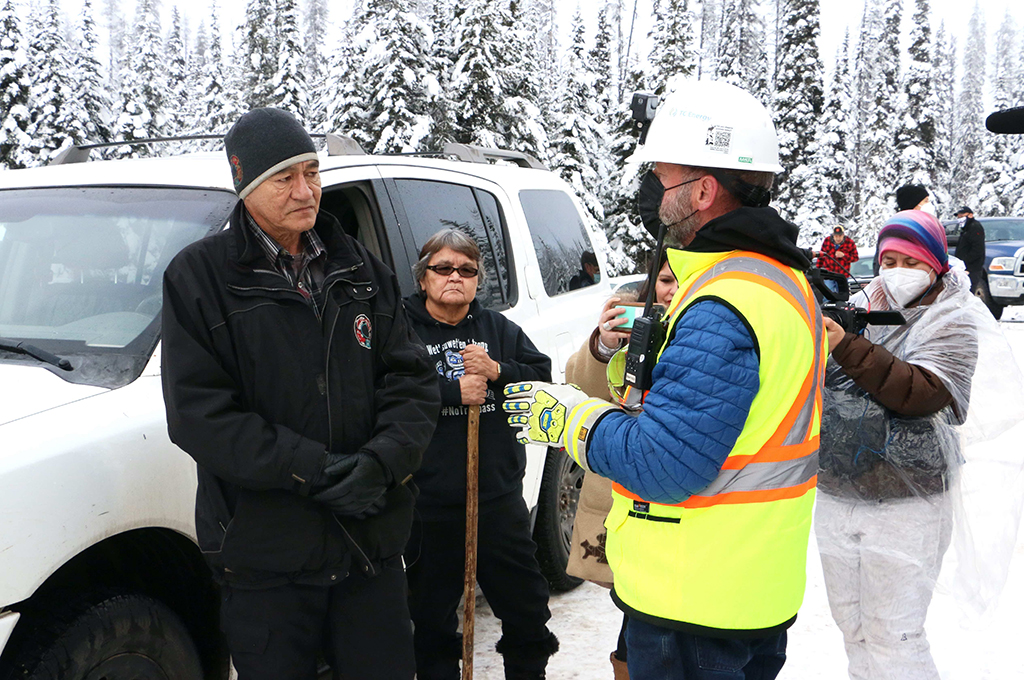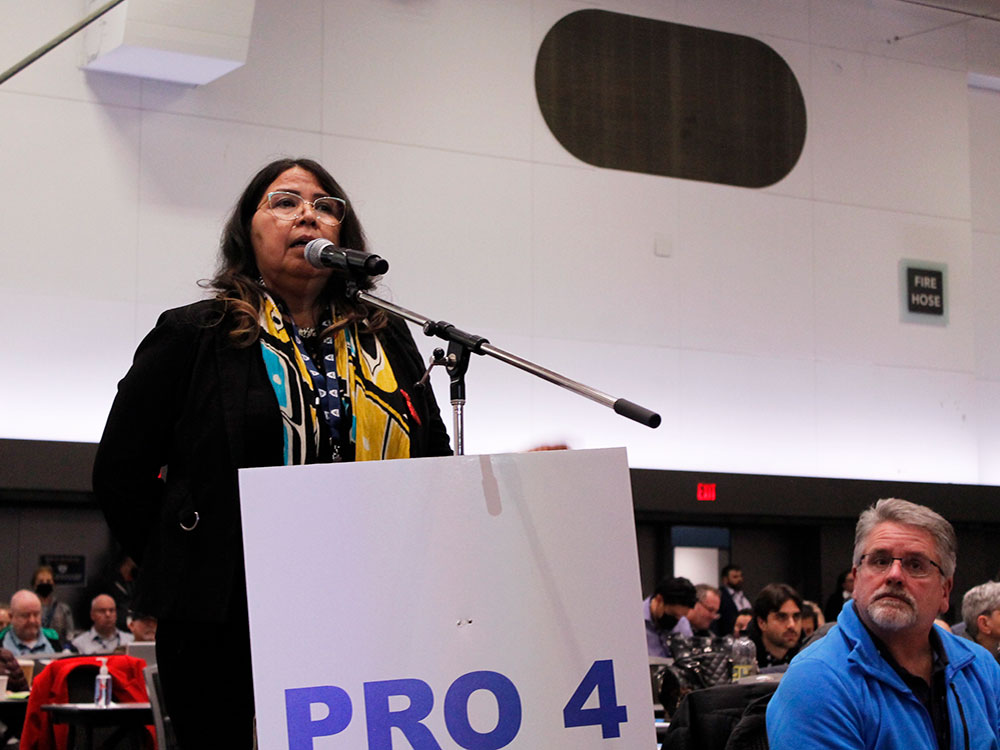Unions representing more than half a million B.C. workers called on the provincial government Tuesday to resolve disputes on Indigenous territories without the use of force, a clear nod to years-long clashes over resource development in the province’s north.
The motion was one of nine the BC Federation of Labour adopted or considered at its convention that dealt with Indigenous rights and sovereignty, including a separate resolution that, if adopted, will see the federation lobby the province to create “impartial police investigation procedures” in cases involving Indigenous people.
The federation also considered several additional resolutions related to Indigenous rights and police oversight, including calling on governments to disband the RCMP’s controversial Community-Industry Response Group, or C-IRG, but ran out of time to vote on the motions Tuesday.
“We need action now,” said Joulene Parent, a member of the International Longshore and Warehouse Union whose mother is from Buffalo River Dene Nation in northwest Saskatchewan. “We need these motions supported, we need these motions forwarded. Not just tokenism, but we need some action.”
The federation, the voice of the province’s unionized workers, often adopts a gamut of resolutions imploring its leadership to lobby senior governments on social justice issues like affordable housing, gender-affirming health care and support for survivors of domestic violence.
Historically, there has been tension in the labour movement between unions who represent workers in resource extraction versus those who take progressive stances on environmental issues.
Some of the motions debated Tuesday are notable for their focus on the rights of Hereditary Chiefs, a key theme in an ongoing dispute between Wet'suwet'en leaders and Coastal GasLink in Wet’suwet’en territory in northwestern B.C.
Other motions included lobbying governments to implement all 94 Calls to Action from the Truth and Reconciliation Commission report, mandatory teaching of the TRC report and the United Nations Declaration on the Rights of Indigenous Peoples in B.C. schools, and increased oversight of police with regard to “injustices by police authorities toward Indigenous Peoples.”
Delegates ran out of time before these motions could be debated and voted on. These motions will now likely be referred to a vote at the next quarterly meeting of the federation's executive council.
Marjorie Dumont, a BC Teachers' Federation delegate and a Wet'suwet'en member, had planned to speak in favour of a motion that called on senior governments to disband the RCMP’s controversial Community-Industry Response Group.
Dumont drew a parallel between the Coastal Gaslink clashes and the experiences of her great-grandparents, who she said were marched by RCMP out of their home community in the early 1890s.
“This is a violation of our rights, human rights. So I just wanted everybody to know we really have to come together to come to terms with stolen land. We have to come to terms with the violence that the police have on our people,” Dumont said.
The BC Federation of Labour claims to represent more than 500,000 union workers across the province and is considered the most powerful labour group in B.C. Its members regularly advocate to improve working conditions and pay but have also lobbied government on a range of social justice issues, including ending the ban on blood donations from men who have sex with men and building more affordable housing.
The federation also considered resolutions Tuesday that will require at least one of each of its own vice-presidents to come from key equity groups, including Indigenous workers, workers with disabilities and LGBTQ2SIA+ workers.
The resolution that passed was put forward by the BC General Employees’ Union, which represents 85,000 members across B.C., many of them in the public service. It described reconciliation as a “necessary and important goal” in fighting for social and economic justice.
It cited the groundbreaking 1997 Delgamuukw Supreme Court of Canada case, which acknowledged that Wet’suwet’en and Gitxsan title had never been extinguished, and called on the BC Federation of Labour to lobby provincial and federal governments “to resolve disputes over the use of Indigenous territory without the use of force and in a manner that respects and honours the sovereignty of Indigenous nations, the authority of Hereditary Chiefs, the United Nations Declaration on the Rights of Indigenous Peoples, the Truth and Reconciliation Commission Calls to Action and the spirit of true reconciliation.”
The resolutions put forward at this year’s conference come as RCMP is increasingly under fire for its role in policing resource extraction conflicts.
The C-IRG was formed in 2017 to police disputes such as the Coastal GasLink pipeline protests in northern B.C. and old-growth logging protests on Vancouver Island. Policing the conflicts has cost tens of millions of dollars.
The group has been accused of violations against protesters and the media, including the temporary suspension of an injunction against old-growth logging protests at Fairy Creek as a result of what the B.C. Supreme Court described as the force’s heavy-handed approach toward protesters and blocking access to journalists.
Officers with C-IRG also patrol the Morice Forest Service Road on Wet’suwet’en territory, where the 670-kilometre Coastal GasLink pipeline is under construction between northeast B.C. and an export facility on the coast in Kitimat. Opposition to the gas pipeline by the nation’s hereditary leadership has led to several high-profile police actions and the establishment of the RCMP’s Community-Industry Safety Office on the Morice road in early 2019.
It’s been a year since the last police action on Wet’suwet’en territory, where about 30 people were arrested over two days under an injunction granted to Coastal GasLink by the B.C. Supreme Court. Two journalists were among those arrested.

Wet’suwet’en Hereditary Chief Na’Moks, who regularly visits the Coastal GasLink pipeline route through the nation’s territory to monitor construction activities, welcomed the news that unions are addressing Indigenous rights and policing issues.
Na’Moks, who also goes by John Ridsdale, was recently threatened with arrest by Coastal GasLink’s private security while attempting to visit the site where Coastal GasLink is drilling under the Morice River. Known to the Wet’suwet’en as Wedzin Kwa, the river is spiritually significant to the nation and provides important salmon habitat.
As Na’Moks was being turned away at the turnoff to the drill site earlier this month, RCMP stationed at the junction stood by but refused to speak with the Hereditary Chief.
“If you think about oversight of the RCMP, it's non-existent. You’ve got the fox guarding the chicken house,” Na’Moks said. “I think, to have the Indigenous oversight… that’s all progress. I don't go for the touchdown. I go for the incremental yardage.
“It's frustrating, it's slow and it's tedious. But it has to be done.”
The motion to disband RCMP’s C-IRG was submitted by MoveUP, which represents more than 12,000 union members across Canada, including support staff at the BC Federation of Labour.
The resolution states that “the RCMP Community-Industry Response Group has violated human rights and civil liberties in violent and racist attacks on First Nations, Inuit and Métis persons, journalists and protesters,” and noted that C-IRG had been “rebuked” by the UN Committee on the Elimination of Racial Discrimination and Amnesty International.
Canada has repeatedly ignored calls from the UN committee to stop resource projects opposed by Indigenous communities, including B.C.’s Site C dam, Trans Mountain pipeline and Coastal GasLink pipeline, as the projects had not received free, prior and informed consent.
The MoveUP resolution also called on the provincial and federal governments to hold C-IRG responsible “for their human rights violations, to cease collusion with private security firms and industry and to require on-site Indigenous civilian oversight of all RCMP operations on Indigenous lands.”
“I love the fact that they’re pushing it,” Na’Moks told The Tyee. “I think it’s up to everybody to keep [these issues] in the conversation. Every step forward is progress.” ![]()
Read more: Indigenous, Rights + Justice, Labour + Industry

















Tyee Commenting Guidelines
Comments that violate guidelines risk being deleted, and violations may result in a temporary or permanent user ban. Maintain the spirit of good conversation to stay in the discussion.
*Please note The Tyee is not a forum for spreading misinformation about COVID-19, denying its existence or minimizing its risk to public health.
Do:
Do not: